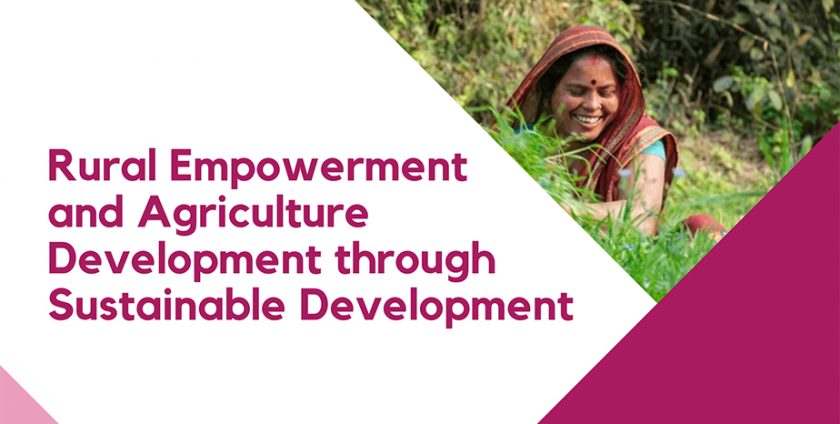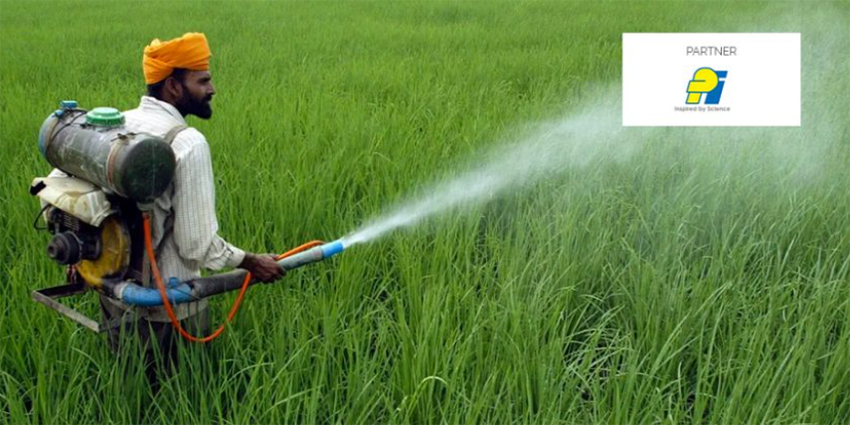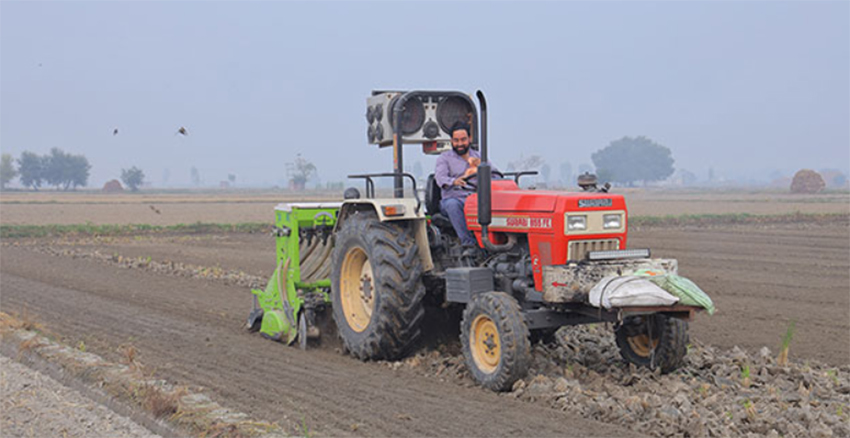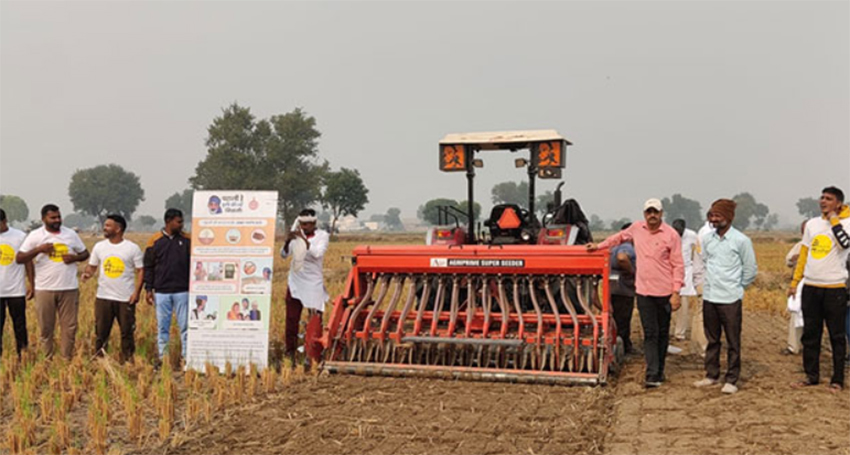
Agriculture is not only the backbone of rural India but also a critical sector for the nation’s overall development. With a majority of the rural population depending on agriculture for their livelihood, empowering these communities through sustainable development initiatives is crucial. Sustainable development in agriculture focuses on practices that are environmentally sound, economically viable, and socially equitable. This approach ensures that agriculture can meet the needs of the present without compromising the ability of future generations to meet their own needs. This blog explores how sustainable development initiatives can drive rural empowerment and agricultural growth, using examples from the Foundation for Development Initiatives (FDI) to illustrate the impact of these efforts.
Understanding Sustainable Development in Agriculture
Sustainable development in agriculture is about integrating ecological health, economic profitability, and social equity into farming practices. This multidimensional approach addresses the environmental impacts of farming, ensures economic stability for farmers, and promotes social inclusiveness in rural communities.
- Environmental Sustainability: Agriculture has a significant impact on the environment, from deforestation and soil degradation to water use and pesticide pollution. Sustainable agriculture aims to minimize these impacts through practices like organic farming, crop rotation, and integrated pest management. These methods help maintain soil fertility, reduce the need for chemical inputs, and conserve water resources, ensuring that farming remains viable for future generations.
- Economic Viability: For agriculture to be sustainable, it must also be economically viable. This means that farmers must be able to earn a decent income from their work. Sustainable farming practices can enhance productivity, reduce costs, and improve market access, leading to increased profitability. Additionally, diversifying income sources through activities like agro-processing and value-added products can help stabilize rural economies and reduce vulnerability to market fluctuations.
- Social Equity: Social equity is a key component of sustainable development. In agriculture, this means ensuring that all members of the community, particularly women, smallholder farmers, and marginalized groups, have access to resources and opportunities. Empowering these groups through education, training, and financial support can help create more inclusive and resilient rural economies.
- Resilience and Adaptability: Sustainable agriculture systems must be resilient and adaptable to changing conditions such as climate change and market fluctuations. This involves diversifying crops and income sources, improving water management, and implementing practices that enhance the resilience of agricultural systems.
The Role of Rural Empowerment in Agriculture Development
Rural empowerment is about enabling rural communities to take control of their development. In the context of agriculture, this means providing farmers with the knowledge, tools, and resources they need to adopt sustainable practices and improve their livelihoods. Empowering rural communities is essential for achieving sustainable agricultural development and ensuring that the benefits of growth are widely shared.
- Enhancing Agricultural Productivity: Empowering farmers with the skills and knowledge needed to implement sustainable practices can significantly enhance agricultural productivity. For example, FDI’s initiative on “Training for Farmers to Promote Safety Measures During Agro-Chemical Application” focuses on educating farmers about the safe and effective use of agrochemicals. This training not only helps reduce the negative environmental impact of farming but also improves crop yields and quality, leading to better income for farmers.
- Building Resilience to Climate Change: Climate change poses a significant threat to agriculture, particularly in rural areas where communities are highly dependent on farming. Sustainable agriculture practices, such as those promoted by FDI, help build resilience to climate change by conserving water, protecting soil health, and reducing reliance on chemical inputs. For instance, the “Harit Dhara Saaf Vayu” initiative empowers communities by promoting sustainable practices that improve air quality and reduce greenhouse gas emissions, thereby helping farmers adapt to changing climatic conditions.
- Social Inclusion and Gender Equality: Empowering women and marginalized groups is crucial for achieving sustainable agricultural development. Women play a vital role in agriculture, yet they often lack access to resources, education, and decision-making power. FDI’s initiatives aim to address these disparities by providing targeted support to women farmers, helping them to become more involved in agricultural activities and benefit from the economic opportunities that farming provides.
- Market Linkages and Value Chain Development: One of the key challenges for rural farmers is access to markets where they can sell their produce at fair prices. Sustainable development initiatives often include efforts to improve market linkages and develop value chains that connect farmers directly with consumers or processors. This helps farmers secure better prices for their products and reduces their dependency on middlemen. For example, FDI’s Crop Residue Management (CRM) Initiative promotes sustainable practices that add value to agricultural residues, thereby creating new income opportunities for farmers and reducing environmental pollution from crop burning.
Case Studies: Sustainable Development in Action
FDI’s work in promoting sustainable agriculture and rural empowerment is exemplified by several key initiatives that have made a significant impact on rural communities in India. These case studies highlight the importance of community participation, knowledge sharing, and innovative practices in driving sustainable development.
1. Training for Farmers to Promote Safety Measures During Agro-Chemical Application

This initiative focuses on educating farmers about the safe and responsible use of agrochemicals. In many rural areas, the lack of knowledge about the proper application of pesticides and fertilizers has led to environmental degradation and health issues among farmers and their communities. FDI’s training programs provide farmers with essential information on the correct usage, storage, and disposal of agrochemicals, helping to reduce the negative impacts of these substances on the environment and human health.
Through this initiative, farmers have learned how to minimize their reliance on chemical inputs by adopting integrated pest management techniques, which combine biological, cultural, and chemical methods to control pests in a more sustainable way. The program also emphasizes the importance of personal protective equipment (PPE) for farmers, reducing their exposure to harmful chemicals and improving their overall health and well-being.
2. Harit Dhara Saaf Vayu: Empowering Communities, Sustaining Lives

The “Harit Dhara Saaf Vayu” initiative is a community-driven program aimed at improving air quality and promoting sustainable agricultural practices. This initiative addresses the issue of air pollution caused by the burning of crop residues, a common practice in many parts of rural India. Crop residue burning not only contributes to air pollution but also results in the loss of valuable organic matter that could be used to improve soil fertility.
FDI’s approach involves training farmers in alternative methods of crop residue management, such as composting, mulching, and the use of crop residues as animal feed. By adopting these practices, farmers can reduce air pollution, improve soil health, and increase their agricultural productivity. The initiative also includes awareness campaigns to educate the broader community about the environmental and health impacts of crop residue burning and the benefits of sustainable alternatives.
3. Crop Residue Management (CRM) Initiative

The CRM initiative is another example of FDI’s commitment to sustainable agriculture and rural empowerment. This program focuses on finding innovative solutions to the problem of crop residue management, which is a major challenge for farmers in many parts of India. Crop residues, such as straw and stubble, are often burned after harvest to clear the fields for the next crop, leading to severe air pollution and the release of greenhouse gases.
Through the CRM initiative, FDI promotes the use of machinery and technologies that allow farmers to manage crop residues more effectively. This includes the use of equipment like the Happy Seeder, which sows seeds directly into the soil without the need to remove or burn crop residues. The initiative also encourages farmers to use crop residues as fodder for livestock, as mulch to conserve soil moisture, or to produce bioenergy, providing additional income streams for rural communities.
By adopting these practices, farmers can reduce their environmental impact, improve soil fertility, and enhance their overall agricultural productivity. The CRM initiative also highlights the importance of collaboration between farmers, government agencies, and non-governmental organizations in addressing the challenges of sustainable agriculture.
The Path Forward: Scaling Sustainable Development
While the impact of FDI’s initiatives is evident in the communities where they are implemented, scaling these efforts to reach more rural areas is essential for achieving widespread sustainable development. The following strategies can help expand the reach and effectiveness of sustainable agriculture initiatives:
- Strengthening Partnerships: Collaboration between governments, NGOs, private sector entities, and local communities is critical for the success of sustainable development initiatives. By working together, these stakeholders can pool resources, share knowledge, and create more comprehensive and impactful programs.
- Leveraging Technology: Advances in technology, particularly in the areas of digital agriculture and precision farming, offer new opportunities for improving agricultural productivity and sustainability. FDI’s initiatives already incorporate technology to some extent, but there is potential to expand the use of digital tools and platforms to reach more farmers and provide them with real-time information and support.
- Policy Advocacy: Effective policies are needed to support sustainable agriculture and rural empowerment. FDI can play a role in advocating for policies that promote sustainable practices, provide financial incentives for farmers, and ensure access to markets and resources for rural communities.
- Community Engagement and Education: Building awareness and understanding of sustainable practices is essential for their adoption. Continued efforts to educate and engage rural communities, particularly women and youth, will help ensure the long-term success of sustainable development initiatives.
Conclusion
Rural empowerment and sustainable agriculture are intertwined goals that are essential for the development of India’s rural communities. By adopting sustainable farming practices and empowering rural populations, we can address the challenges of poverty, food insecurity, and environmental degradation. The Foundation for Development Initiatives (FDI) is dedicated to advancing these goals through its comprehensive programs, which include capacity building, access to resources, market linkages, and community engagement. The success of FDI’s initiatives, as demonstrated by the case studies discussed, underscores the importance of sustainable development in driving rural empowerment and agricultural growth. As we look to the future, scaling these efforts and expanding their impact will be key to building a more sustainable and equitable rural economy in India.
FAQs
Sustainable development in agriculture involves adopting farming practices that are environmentally sound, economically viable, and socially equitable. It ensures that agriculture can meet the needs of the present without compromising the ability of future generations to meet their own needs.
Sustainable agriculture empowers rural communities by providing them with the knowledge, tools, and resources needed to improve their farming practices, increase productivity, and enhance their economic stability. It also promotes social inclusiveness by ensuring that all members of the community, including women and marginalized groups, have access to opportunities and resources.
Examples of sustainable farming practices include crop rotation, organic farming, integrated pest management, conservation tillage, and the use of renewable energy sources. These practices help maintain soil fertility, reduce environmental impact, and improve the resilience of farming systems.
The Foundation for Development Initiatives (FDI) promotes sustainable agriculture through various initiatives that focus on educating farmers, providing them with access to modern technologies, and encouraging the adoption of environmentally friendly practices. FDI also works to build market linkages and develop value chains that benefit rural farmers.
Community participation is crucial in sustainable agricultural development as it ensures that the needs and perspectives of local farmers are considered in the planning and implementation of initiatives. When communities are actively involved, they are more likely to adopt and sustain the practices introduced, leading to long-term success.
Yes, some examples of FDI’s initiatives include the “Training for Farmers to Promote Safety Measures During Agro-Chemical Application,” the “Harit Dhara Saaf Vayu” program, and the “Crop Residue Management (CRM) Initiative.” These programs focus on educating farmers, promoting sustainable practices, and improving environmental health in rural communities.
Sustainable agriculture addresses climate change by reducing greenhouse gas emissions, conserving water, and improving soil health. Practices such as crop residue management, organic farming, and agroforestry contribute to carbon sequestration and reduce the overall environmental footprint of farming.
Sustainable agriculture can improve the livelihoods of rural farmers by increasing crop yields, reducing input costs, and providing access to new income opportunities through value-added products and market linkages. By adopting sustainable practices, farmers can achieve greater economic stability and resilience to market fluctuations.
Challenges include limited access to resources, lack of awareness or education about sustainable practices, resistance to change, and financial constraints. Addressing these challenges requires targeted interventions, capacity-building programs, and supportive policies.
The impact of sustainable development initiatives can be scaled by strengthening partnerships between governments, NGOs, and private sector entities, leveraging technology, advocating for supportive policies, and continuing to engage and educate rural communities. Expanding successful models to new regions can also help increase their reach and effectiveness.
0 Comment
Leave a Reply